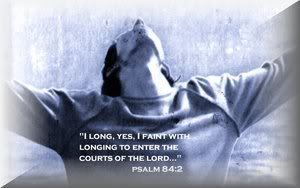Author: The sons of Korah (temple assistant)
Background: Psalm 84 expresses the thoughts of a passionate Worshipper who wants to go to Jerusalem to celebrate one of the three annual feasts (Exodus 23:17; 34:23) but could not. The psalmist inability to attend the feast did not rob him of the blessings of fellowship with the LORD. All who are pilgrims can make the same three affirmations that he made:
1) His Delight Is In The LORD (VV1-4) - the important thing is that we have a HEART devoted to the LORD, a spiritual hunger that cries out for intimate fellowship with the LORD (Psalm 42:1-2; Matthew 5:6)
2) His Strength Is In The LORD (VV5-8) - true worshippers "go from strength to strength" (Deuteronomy 33:25; Isaiah 40:28-31; Philippians 4:13) and trust God to enable them to walk a step at a time even in difficult situation [valley of Bara (weeping) - V6]
3) His Trust is In The LORD (VV9-12) - when we walk by faith, we put the LORD and His will first, and we keep our priorities straight (V10). This is the Old Testament version of Matthew 6:33 and Philippians 1:21
Do we delight in the LORD and seek Him? Do we depend on His strength? Do we walk by faith and trust in Him? Yes, "Even faints for the courts of the LORD; my heart and my flesh cry out for the living God" (VV1-2).
"Even the sparrow has found a home, and the swallow a nest for herself, where she may lay her young" (V3). In other word, God's Living house is to his soul what a nest is to a swallow - a place of rest and security and satisfaction. The psalmist even envies the priests. "Blessed are those who dwell in Your house; they will still be praising You" (V4). Outsiders were not allowed to live there, and they were limited in where they cold go inside. Only the priests could enter the Holy of Holies.
Today, we have the privilege of fellowshipping with God without going through a priest. Do we have a desire and a hunger to worship Him? Does our hearts cry out for the living God. Or are we happy for an excuse to be somewhere else from God's house?
May we pray and hunger like David, "As the deer pants for the water brooks, so my soul pants for You, O God. My soul thirsts for God, for the living God" (Psalm 42:1-2).
Be blessed with this song: A Place At Your Altar - Hosanna Music










